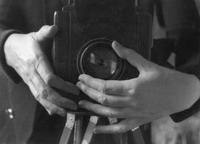New York police department sued for detaining and questioning photographers
The police department was accused of detaining and questioning photographers and filmmakers who take pictures of city landmarks.

The suit was filed on behalf of Arun Wiita, a 26-year-old graduate student at Columbia University who the New York Civil Liberties Union said was handcuffed in July after an officer spotted him photographing a Manhattan subway station.
The police let Wiita go after about a half hour and he was never charged with a crime, but he said he was humiliated by the encounter.
"Cops do have a responsibility to act on suspicions they might have, but any reasonable person should see that you shouldn't get handcuffed for holding a camera on a street corner," Wiita said.
Wiita said he believes he was singled out because of his ethnicity. He was born in the United States and his family lives in New Jersey, but his mother is from India.
The NYCLU said the primary goal of the lawsuit is to push the department to train its officers not to bother law-abiding photographers.
Police Department spokesman Paul Browne said officers do, on "rare occasions," question people photographing the city's rail infrastructure, and he defended it as a necessary exercise in preventing terrorism.
He cited an instance in which investigators identified men taking photographs of city bridges and subways as Iranian intelligence agents, and an episode in which suspected members of a Pakistani terror group were stopped by police from taking pictures of the Brooklyn and Williamsburg bridges.
The lawsuit, filed in U.S. District Court in Manhattan, represents the second time the NYCLU has challenged the way the city treats camera operators.
Earlier this year the city settled a lawsuit filed on behalf of award-winning Indian documentarian Rakesh Sharma, who was detained for filming with a handheld camera on a Manhattan sidewalk.
As a result of that case, the mayor's Office of Film, Theatre and Broadcasting twice revamped its rules regarding the use of cameras on streets, parks or public property.
The first set of rules, which could have required a permit and a $1 million (690,000 EUR) insurance policy for any group filming or taking pictures in one spot for more than 30 minutes, was junked after a public outcry.
At the time of his arrest, Wiita was in the early stages of a project to photograph all 468 of the city's subway stations. He was shooting only his fifth station when he was stopped by an officer on the sidewalk.
The officer was friendly and professional, Wiita said, but he demanded to see his pictures and his identification, then handcuffed him for about 30 minutes while authorities checked his background and reviewed the images stored in his digital camera. He was then sent on his way.
Wiita is seeking compensatory damages, but says he does not expect a big payout.
"I would much rather see the NYPD change its procedures," he said.
He also wants the court to order the department to expunge information related to the incident from a database the NYCLU claims is maintained by the NYPD's intelligence division.
Subscribe to Pravda.Ru Telegram channel, Facebook, RSS!




